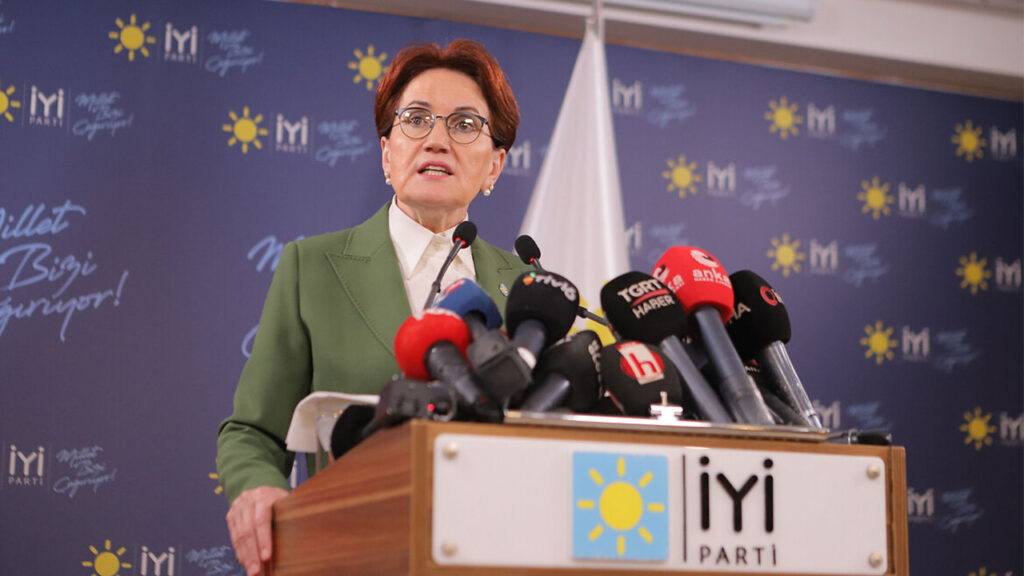Meral Akşener, the leader of Turkey’s nationalist opposition Good (İYİ) Party, has come under fire for an aggressive speech she gave at a party congress targeting her election ally, the main opposition Republican People’s Party (CHP).
Akşener was re-elected as the İYİ leader during the third ordinary congress of the party on June 24 in which she stood as the only candidate. She targeted the party rank and file and other opposition parties criticizing the İYİ Party for defeat in the presidential election, mainly focusing on the CHP, in a speech she gave during the event.
President Recep Tayyip Erdoğan won a runoff election on May 28 against the main opposition coalition, the Nation Alliance, that nominated CHP leader Kemal Kılıçdaroğlu as its presidential candidate, with Erdoğan securing 52.18 percent of the vote while Kılıçdaroğlu received 47.82 percent.
Akşener described the period when they entered the parliamentary elections by taking 15 deputies from the CHP as “the biggest regret” of her life. She added that this situation caused İYİ Party to become dependent on the CHP.
In 2018, 15 deputies from the CHP joined the İYİ Party in order to allow the latter to form a parliamentary group and thus remove the obstacle to its participation in the general election.
Drawing attention to the “contributions” of her party in the 2019 İstanbul local elections, where the CHP’s Ekrem İmamoğlu ended the years-long Justice and Development Party (AKP) rule in the city, Akşener reacted to arguments that the elections were won thanks to the strategic votes of the pro-Kurdish Peoples’ Democratic Party (HDP).
The İYİ leader also commented on the loss of the 2023 presidential election, saying that her party took an active part in Kılıçdaroğlu’s presidential campaign but that their efforts have been ignored.
Akşener also targeted İYİ Party members and said she can’t stand the “ugliness” of those who do not stop seeking higher positions in the party even after they are elected as lawmakers. She added that she would do “what is necessary” for those who have been harming the party with their statements.
Saying that the congress was a time of reckoning, Akşener emphasized that just as she would be held to account, she would also hold the party members to account.
Political scientist Nurettin Kalkan on Monday told Deutsche Welle Turkish service that he saw a “vague” anger in Akşener’s speech, indicating that it is not possible to grasp the İYİ’s roadmap from the speech.
Kalkan said that as the local elections approach, the factions within the party favoring collaboration with the CHP may gain more influence, making it possible to form a “partial and reconfigured election alliance.”
Political scientist Kerem Yavaşça also stated that Akşener did not completely close the door to alliances and might have her party play a more prominent role within the alliances or act more independently than before.
Yavaşça further indicated that Akşener’s approach could pose a challenge for the opposition to continue the success achieved in the local elections of 2019. He thinks there is a high probability of important major cities such as Ankara and İstanbul falling into the hands of the AKP again if the CHP and the İYİ Party don’t nominate a joint candidate.
Journalist Fatih Altaylı on Monday said in a column on his personal website that Akşener, the İYİ Party’s founder and “greatest strength,” have also been the cause of the party’s “greatest damage.”
Altaylı said he observed that the lack of anger management was “the one obstacle” standing in the way of Akşener being a good politician.
“I wonder what benefit it served for her to utter such harsh words about a party she had walked alongside for years, even though the uncertainty of politics leaves us unsure whether they will come together again in the future,” the journalist added.
Meanwhile, the Cumhuriyet daily on Monday reported, citing rumors in İYİ circles, that Akşener didn’t completely close the door to the Nation Alliance and aims to field mayoral candidates in four major cities – Adana, Mersin, Manisa and Antalya – that have a predominantly nationalist-conservative voter base and seek support from the CHP in the local elections next year.
